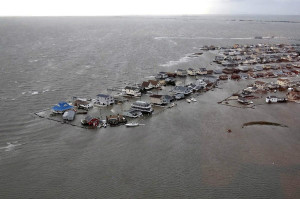We have much more to do and your continued support is needed now more than ever.
An Updated Social Cost of Carbon Shows that the Economy Benefits from Cutting Carbon Pollution
Just before the weekend, the Obama Administration nodded in the direction of more responsive limits on carbon pollution, and acknowledged that the science and economics tell the story that many are already seeing around the country and worldwide. As carbon emissions rise, so does the severity of their impacts, and the costs associated with addressing them. Despite certain congressional and industrial reluctance to respond to the consequences of burning fossil fuels, the White House moved Friday to accept one unavoidable truth: the cost of inaction in responding to climate change is rising.

Coupled with new energy efficiency standards for microwave ovens, finalized by the Department of Energy last week, the White House announced an important update to the values used to calculate the Social Cost of Carbon. These values draw on the best available climate science, and therefore change with constantly incoming data.
What exactly does this update mean?
The SCC does more than just tell us how expensive carbon emissions are. It also applies a monetary value to avoiding future emissions. SCC models predict just how much money we can save ourselves by delivering comprehensive climate policy and effectively cracking down on polluters.
In the case of microwave ovens for example, the predicted net benefits of the new standards to go into effect in 2016 total $4.6 billion over the next 30 years. Prior to the SCC update, estimated benefits were lower, at $4.2 billion.
This update was critical, but far more critical is that it helps the government’s number-crunchers more effectively evaluate the policies that our environment, our communities, our wildlife, and our economy so severely need. It is certainly a step in the right direction in properly evaluating the economic benefit of standards intended to help stave-off the worst case scenarios of climate change.
We have heard the President’s commitment to address climate change, and on Friday we saw a step in the right direction.
Now that the SCC more accurately reflects the reality that the economic damages associated with climate change are only getting worse, there is even less space for inaction. Updated impact assessments will echo what observations of wildlife and habitat loss have been telling us for years—that we cannot afford to wait any longer. The truth is in the numbers.
![]() Help keep up the momentum by urging President Obama to announce strong plans to limit carbon pollution.
Help keep up the momentum by urging President Obama to announce strong plans to limit carbon pollution.





















